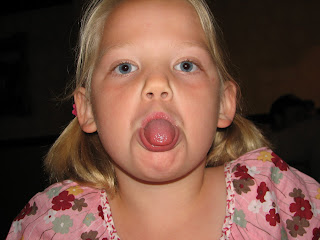Today was Day 2 of a three-day
Theodore Roosevelt Symposium featuring speakers and participants from across the country and sponsored by
Dickinson State University. I was not able to participate last year, but I registered for it this year (no cost to faculty, staff, or students) so that I might attend as much of it as possible. I've never really known much about President Teddy Roosevelt, but he's a very big deal in southwest ND (and at DSU; check
this out) due to his having lived here before his presidency and his having attributed his success in life at least partially to his experiences while here. I decided to take advantage of this opportunity to learn more.
I had appointments throughout the day, but I was able to attend a late-afternoon presentation by Dr. D. Jerome Tweton (professor emeritus of history at the
University of North Dakota) . . . that focused
not on President Roosevelt but
instead on the
Marquis de Mores, a contemporary of Roosevelt's whose fame in this region comes from his having founded the nearby town of
Medora, a major tourist attraction for the state. Although not much about Roosevelt, it was interesting nevertheless; it expanded on what our family had heard about the Marquis from the guides on
our tour of the Marquis' chateau in Medora in July.
Afterward I accompanied my colleague Autumn (herself a history major) to a social held at the beautiful
Alumni/Foundation House just east of campus. We enjoyed wine, appetizers, and conversation before supper, which was held across the street (and back on campus) in the Student Center ballroom. I sat next to Rebecca, a representative of the
Theodore Roosevelt Association. Her previous jobs included ten years in the
U.S. Navy and some positions with historical preservation groups that purchase and restore Civil War battle sites. As you might imagine, she was an interesting conversationalist. (And the meal was good, too: spinach salad with raspberry dressing, slivered almonds, and craisins; multi-grain dinner rolls and butter; two medallions of steak; mashed potatoes; steamed broccoli; chocolate cake layered with cherries; and coffee and water.) (That description was for our "game night" friends' benefit, by the way.)
The speaker during supper was Lowell Baier, executive vice president of the
Boone and Crockett Club, a non-profit organization that is part of President Roosevelt's conservation legacy in America. Tomorrow he and others from his organization will join TR Symposium participants in traveling to Roosevelt's
Elkhorn Ranch about an hour from here in the heart of the ND Badlands. The Boone and Crockett Club was instrumental in the
recent purchase of that land by the
U.S. Forest Service, and the acquisition of Roosevelt's ranch will be commemorated tomorrow in conjunction with the Symposium. (However, not everyone in the region is happy about the event; read
this.)
After supper, we attended the "world premiere" of
TR: That Man in the White House (subtitled "How Theodore Roosevelt Thirsted for Re-election in 1904 and Bested His Political Rivals While Refusing to Compromise His Core Political Values"--whew!), a radio drama adapted from a full-length script by Hermann Hagedorn and Allan Kenward. It was broadcast live over local radio and featured DSU students, faculty, and friends portraying the roles in
reader's theatre style. Performing the role of Roosevelt was
Clay Jenkinson, a regional "man of letters" known nationally for his syndicated radio program
The Thomas Jefferson Hour and regionally for his scholarship and "historical interpretations" performing as Jefferson, Meriwether Lewis, and Roosevelt. He also serves as director of the newly created
Theodore Roosevelt Center on our campus and as moderator of the TR Symposium itself. His performance was appealing, and being part of a live radio broadcast was fun, too.
Although I never particularly enjoyed history in high school, I have found myself more and more intrigued by the subject with each passing year (perhaps due to my
becoming more and more historical over time). I'm glad to have taken advantage of this local opportunity for self-enlightenment on historical topics of both regional and national significance. And if
you have clicked on any of the links provided above, then you,
too, have learned a bit more about Theodore Roosevelt, just as I did from participating in the Symposium.












 This spring,
This spring, 














